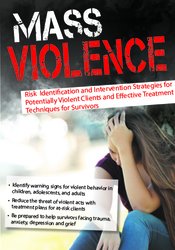
Following acts of mass violence clinicians are often left feeling powerless, anxious and looking for answers.
Why does this happen? Can I identify the warning signs and Intervene with those at-risk of committing violent acts? What can I do to help survivors facing the devastating scars of trauma, anxiety, panic depression and grief left behind by unspeakable violence?
A must-watch for mental health professionals working in an era of pervasive violence, this critical recording will explore the connection between mental health issues and violence, analyze research and research limitations surrounding its study, and contemplate the role of clinicians in both the prevention and aftermath of mass violence.
Better still, this seminar will go beyond the research and give you detailed clinical guidance on working with a variety of populations and ages, including children, adolescents, parents and community members who may walk into your office as a person at-risk of committing a violent act or as a survivor of one.
YOU CAN’T AFFORD TO BE UNPREPARED
Buy today and feel ready and able to identify the risk factors, effectively intervene with clients at-risk of performing violent acts, and provide hope and healing to those whose lives have been engulfed by mass violence.
| File type | File name | Number of pages | |
|---|---|---|---|
| Manual - Mass Violence (5.60 MB) | 72 Pages | Available after Purchase |

Kathryn Seifert, PhD, is a psychologist in Maryland and one of the leading experts in the fields of multi-victim violence, bullying, trauma and mental health related violence in the United States. Dr. Seifert specializes in the assessment and treatment of individuals who are at risk for violence and those who are emotionally disturbed, behaviorally disordered, victimized, delinquent, and/or suffering from attachment disorders.
Dr. Seifert has appeared on CNN, Discover ID, and Fox News and consults with numerous public agencies. She testifies in courts as an expert on the maltreatment of children and has a blog, Stop the Cycle, on Psychologytoday.com with over a half million readers.
Dr. Seifert has written two books, How Children Become Violent (Acanthus, 2006) and Youth Violence: Theory, Prevention, and Intervention (Springer, 2015). In these two books, she wrote about the groundbreaking research such as the ACE’s research out of the CDC, connecting child maltreatment, delays in the development of coping skills, and youthful violent behaviors. Dr. Seifert also developed the CARE-2, Child and Adolescent Risk/Needs Evaluation.
Speaker Disclosures:
Financial: Dr. Kathryn Seifert is the Chief Executive Officer and Founder of Eastern Shore Psychological Services; and CARE-2, LLC. She receives royalties as a published author. Dr. Seifert receives a speaking honorarium and recording royalties from PESI, Inc. She has no relevant financial relationships with ineligible organizations.
Non-financial: Dr. Kathryn Seifert has no relevant non-financial relationships.
Please wait ...